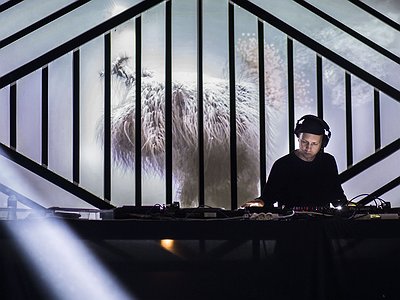Part 3
Could you describe your creative process on the basis of a piece or album that's particularly dear to you, please? Where did the ideas come from, how were they transformed in your mind, what did you start with and how do you refine these beginnings into the finished work of art?
I recently thought about writing a journal that details the sources and processes of all tracks I made while I still remember the details and can load the programs to look things up. You know, obsolescence creeps up so quickly that you hardly notice it at first. Like, I had burned data to CDrs, and they became unreadable within less than a decade. I have some early tracks on DAT cassettes, ZIPs full of samples, patches in synths that won't power up. Thus not everything is retrievable.
The earliest things consisted just of a dozen samples arranged in Cubase and put through the Fireworx. That's it. Around the time of the 'Blood EP', my production had become incredibly complex. It would take quite long to describe all the steps. If we look at something more recent, such as 'An Ardent Heart', the process becomes simpler again. This short album is something like an exercise in managed readymades. There are layers of sound that came into being by connecting an Urzwerg sequencer to a synth and then trying random patterns. With the Urzwerg you can dial in random pitches quite easily, and it can run multiple pattern lengths simultaneously. It's a great tool for polymetric improv. I'd record long sessions with this set up and tweak the synth and the patterns and later take the moments I liked. Around these I'd build a beat and add other elements that relate to it. But the core is pretty much a chance result within some constrains which I programmed, or which also come from the layout of the machines of course. I don't feel under any obligation to consciously plan each detail, like those early academic electronic composers who'd show up to work with a roll of graph paper tucked under their arm. Nothing good ever came of this approach, so I'd just trust the material in a way. Of course I have some ideas about tuning, phrasing, metric properties, linking up pitches and dynamics and so on, but I'll allow for a lot of feedback from the material to see how to make it come together in the most intriguing way.
Part design, part organic growth and emergence. In the end good art is not about yourself. It speaks to other people because they find something in it that exceeds the individual that bothered making the stuff, not because they care about how you chose to express yourself. So the less you are concerned with stamping your ego all over it and the more you care for uncovering structure that is inherent in the setting, the more you stand a chance to come up with something relevant. That's what I usually try doing.
There are many descriptions of the ideal state of mind for being creative. What is it like for you? What supports this ideal state of mind and what are distractions? Are there strategies to enter into this state more easily?
Shut down your internet connection.
How is playing live and writing music in the studio connected? What do you achieve and draw from each experience personally? How do you see the relationship between improvisation and composition in this regard?
I stopped doing dance music live sets. Now I only play live with more, for lack of a better word, 'experimental' material. When playing techno live I felt I was mostly harming the tracks that were best conveyed in their fixed studio versions. Some people are just playing loops in Ableton, and that doesn't have that detrimental effect of butchering a great studio job, but it's DJing in disguise of course. So I prefer to just DJ – I'm amazed how this is still such a powerful form of interacting with people. There's nothing else like it because you're sharing something that's as detached from yourself as it is from the dancers. It feels closer. When you are on stage holding an instrument you're in a totally different spot from your audience, so that's quite different.
In the studio I'm dancing with the machines. That's another very fine experience. You get to see all the routes something could go down. I have one record where I tried to build a track around a synth sound, and it just didn't work. But what I built around it worked once I muted that synth part, so I threw it out and finished the track without it, figuring I could try another thing on it later. I did, but that didn't work either. So I ended up having four tracks built around the same sound, but that sound now isn't even on the record. It's just some form of invisible failed government. You only see the damage. So in the studio you get very different insights from what you find on records or hear in clubs.
How do you see the relationship between the 'sound' aspects of music and the 'composition' aspects? How do you work with sound and timbre to meet certain production ideas and in which way can certain sounds already take on compositional qualities?
I think this distinction is entirely anachronistic because it refers to a setting that worked with notation. In the field that could be called 'recording arts', which includes electronic music, – i.e. all music that is constructed in the recording medium rather than on a sheet of paper – the sound is the composition. There is no possible separation. That's essentially true since Elvis. In the example of repetitive FM I gave earlier, the entire composition is compressed into a half bar loop. The only reason that the track goes on for five minutes is that you need repetition for the gestalt to arise, for the composition to transfer its properties onto your cognitive apparatus and have its emergent entities come to life. The process is called statistical learning. Think of infant language acquisition. It is repeated exposure that leads a child to develop a sense for applied phonetics, grammar, semantics and so on. Techno does something very similar. In this setting it is entirely impossible to separate structure from timbre or dynamics. Of course analysis is still possible, but it is mostly beside the point. Every time I open a paper or book by a musicologist that 'analyzes' techno and I see standard notation, I just have to laugh. It's the “man with the hammer”-syndrome, really.
Respectively when I work, I listen to sounds unfolding in loop mode and dial in changes until things fall into place. It's a totally inverted assignment of 'form' and 'nuance' – the DJ can mostly mix in and out of a techno track without harming the composition at all. In classical music you can play around with articulation and dynamics and get different valid interpretations of the same composition. Not so in techno.
Our sense of hearing shares intriguing connections to other senses. From your experience, what are some of the most inspiring overlaps between different senses – and what do they tell us about the way our senses work? What happens to sound at its outermost borders?
You mean like when you pick up a person in a club and then you get to touch your bodies? I'm almost inclined to say there are so many aspects to examine at the core of sound and its perception that the outer bounds aren't all that interesting by comparison. But I agree that the distinctions between music and medium or between different domains such as analog and digital can be much fun to play around with. I've done that a lot – just probing what techno's habitat is, in terms of carriers, form, perception.
Art can be a purpose in its own right, but it can also directly feed back into everyday life, take on a social and political role and lead to more engagement. Can you describe your approach to art and being an artist?
I come from a family background where good reasons prevailed for skepticism about projecting political agendas onto art. After all, I grew up under governments that tried to force art to be political, in a predetermined way of course – so called socialist realism. My father who was neither a dissident nor a person seeking confrontation intriguingly managed to get away with entirely 'autonomous' music, that is one that rejected any projects outside of music trying to shape the latter. I tend to subscribe to this idea too. The political contexts of music are just too fleeting to build your work around them as an artist.
In my experience the merger of politics and music never works because musical form and external message just don't gel. It is impossible to establish universal or even just stable units between both. That's different on an individual level of course – we can and do have very strong and persistent individual associations with music. But it appears almost impossible to impose those onto others without experiencing significant shifts in the message. You know, the outrages when something ends up being used in advertisement or at a political rally of the wrong party... but the idea that the initially perceived context is the only right one is the fallacy here. People will just take the form and make something entirely different of it. Trying to prescribe meaning is something for people with totalitarian aspirations, and I'm personally not too fond of such tendencies.
To me the real power of the arts is that they can transcend everyday politics. They offer a glimpse into a world that overcomes today's conflicts. Maybe with different conflicts, but that people who are totally at odds over other issues can relate to the same abstract content is incredibly powerful. The key is to keep things open and in flux.
The irony is that doing the opposite – fixing music to one political agenda – just always fails and people never learn this. For instance there's this story of how the Romanian royal anthem became a communist partisan song in Albania, and later the national anthem of Albania. After WWII the melody was prohibited in Romania, and you could end up in some labor camp for playing it. And then of course an official delegation came from Albania and the anthem was supposed to be played ...
I suspect there is another rationale behind artists feeling an urge to attach political meaning to their work. I guess in most of the cases it's just plain old PR, because each musician needs to sell something, and when the music doesn't sell they try to attach something that adds value to them and takes value from others. What it boils down to then is just tacky sales tactics. Unfortunately in an overcrowded market it becomes increasingly difficult to move units, sell shows etc just with the intrinsic quality of the music. Thus we will see more and more political PR attached to music for the sake of trying to grab attention.
It is remarkable, in a way, that we have arrived in the 21st century with the basic concept of music still intact. Do you have a vision of music, an idea of what music could be beyond its current form?
We are all poking at it, one poke at a time. The fascinating thing with complex adaptive systems is that due to their non-linearity predictions are nearly impossible and usually wrong. In this sense I don't have a vision, but I have a number of points I plan to probe. So there's some reflexivity here. Music is made by people, and as they take rounds of guesses at which kind of change to the current state might prove worthwhile, they shape the future through their actions.







